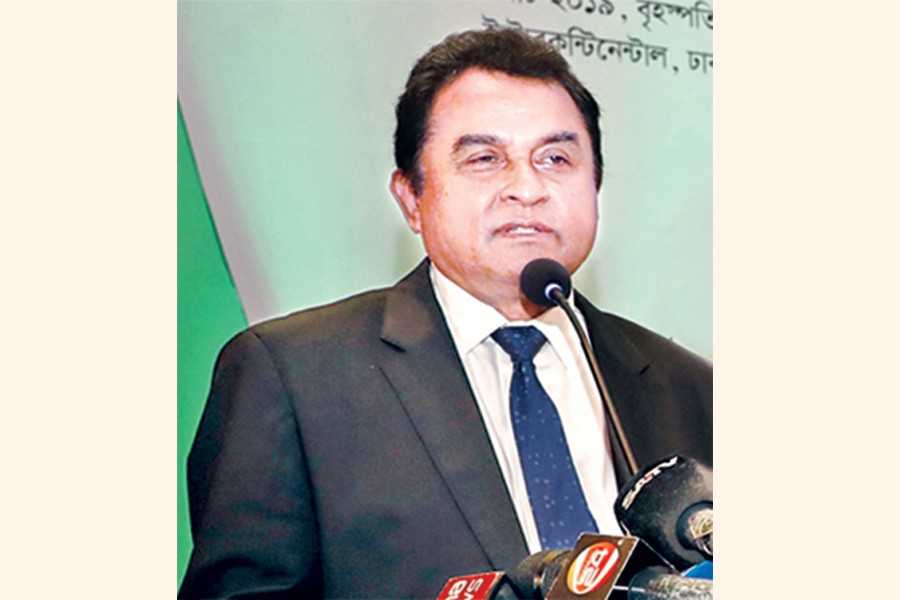Bangladesh economy successful in every areas after Covid shock: Mustafa Kamal

Image collected
Bangladesh fares much better than a great many other countries in recovering from the monetary fallout of the coronavirus pandemic, Finance Minister AHM Mustafa Kamal has said, bdnews24.com reports.
And the credit would go to Prime Minister Sheikh Hasina, according to Kamal. In his words, Hasina is propelling Bangladesh with her “unbelievable” skills to a nation dreamt of by her father Bangabandhu Sheikh Mujibur Rahman.
Within an interview with the news agency, the finance minister said the announcement of the stimulus package amid the coronavirus outbreak in Bangladesh and the next reopening of the economy were timely interventions by the federal government.
“We are successful in macroeconomy. All of the sectors are flying high. All of the indices are improving. No other country is in such a condition now,” he said.
Kamal reveal the overall financial condition of Bangladesh, the banking sector, the currency markets and several other issues in the interview.
The Asian Development Bank in a recently available report said Bangladesh’s gross domestic product is expected to grow by 6.8 % in the fiscal year 2020-21, as the government’s target is 8.2 percent.
The growth reflects a gradual recovery, supported by a solid manufacturing base and strengthening of growth in export destinations, the ADB said.
Kamal referred to the ADB’s observation that Bangladesh’s economy shows early signs of recovery.
“The ADB made the forecast seeing our performance in 8 weeks (July and August). We will certainly manage to achieve the 8.2 % growth target if we can work well in the rest of the financial year,” he said.
He also noted that Bangladesh’s GDP growth remained above 7.0 % in the past few years, as the Bangladesh Bureau of Statistics reported 5.24 % growth in fiscal 2019-20 despite the pandemic.
Kamal said forex reserves above $39 billion have raised his hopes for an instant recovery.
He believes the reserves will cross $42 billion by December and $50 billion in another year if the expatriate Bangladeshis continue sending money in the same manner they are doing now regardless of the pandemic.
The federal government is seriously pondering over a plan to finance its electricity transmission and distribution projects with funds from the foreign exchange reserves following Hasina’s instructions, Kamal said.
He argued that using the reserves for government projects will be rewarding for the country since it must pay 4-5 % interest on foreign loans while investing reserves abroad will not yield a lot more than 1.5 per cent interest.
“We've enough reserves to pay import costs of almost a year. We can keep what is had a need to pay the import costs of 90 days and take the rest. It'll increase investment in the united states and impact the economy positively,” he said.
The finance minister said exports have begun smarting from the Covid-19 shock on the trunk of a 2.17 % growth in July-August period.
The federal government propped up the garment industry, the major exporting sector of the country, with the injection of around Tk 100 billion in incentives to pay the staff that Kamal believes helped exports to rebound.
“We’ve kept inflation under control like we always do. The stimulus package geared up investment. And on the import front, low fuel oil prices have kept us in the safe place,” he said.
Asked whether the government was planning more stimulus packages to cushion the economy from the impacts of Covid-19, Kamal said, “There is no reason to think that investment will stall after the incentives go out. We will continue with expansionary monetary policy to increase investment. And we'll surely announce more incentives if essential to bring pace to investment.”
The government has taken down the lender lending rate to 9.0 per cent as Hasina had promised. “Both banks and the investors are reaping advantages of this rate,” he said.
“And several had said we would not have the ability to do it, but I’d always said there will be no losses. The earning could be low due to low interest rate, but net gain will be high, for the reason that banks need not write off bad debts now,” Kamal said. He blamed Bangladesh’s legacy of bad debt on the old practice of lending money at 14-15 % interest rate.
Kamal also said he previously told the state-owned commercial banks that they need to are powered by their own money because they might not get capital from the federal government anymore.
“We’ve taken steps to lessen bad debts. I am hoping they will yield great results.”
He credited government decisions, such as for example overhauling Bangladesh Securities and Exchange Commission, which left the currency markets vibrant even amid the pandemic.
“The market is regaining the trust of the investors. I hope we will see the market in a good state.”
Source: https://www.google.com
Tags :
Previous Story
- Budget does not address woes of expatriate occupation,...
- Budget for coronavirus-battered education sector unchanged
- Kamal marshalling development partners to help with COVID-19...
- Govt in great pickle over next fiscal year’s...
- GDP growth to plunge to 33-year low this...
- Govt seeks $1b from IMF, World Bank
- Kamal seeks WB, IMF works with to handle...
- Surplus money withdrawal bill stokes stock investors' fear